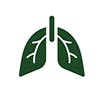Click HERE to see the CDC recommendation for RSV vaccination for adults
You are about to leave a GSK website
You are about to leave a GSK website. By clicking this link, you will be taken to a website that is independent from GSK. The site you are linking to is not controlled or endorsed by GSK and GSK is not responsible for its content.
CONSIDER THE CDC RECOMMENDATION FOR VACCINATING APPROPRIATE PATIENTS AT RISK OF SEVERE RSV
Discussing and recommending RSV vaccination for appropriate adults is important.
Vaccination is available to help protect older adults, including adults aged 50-74 years with certain chronic conditions who may be at increased risk for severe RSV infection.1
The CDC recommends2:
Adults
50-74
years of age who are at increased risk of severe RSV disease receive a single dose of RSV vaccine
Adults
≥75
years of age receive a single dose of RSV vaccine
List of CDC-identified risk factors for severe RSV disease2,3:
Qualified vaccinators, including pharmacists, nurse practitioners, and other providers (based on state and jurisdictional law) may determine patient eligibility for RSV vaccination based on clinical assessment, even in the absence of medical documentation of a named risk condition. Patient attestation is sufficient evidence of the presence of a risk factor; vaccinators should not deny RSV vaccination to a person because of lack of documentation.

Chronic lung or respiratory disease
(eg, COPD, emphysema, asthma, interstitial lung disease, or cystic fibrosis)

Chronic liver disease
(eg, cirrhosis)

Chronic cardiovascular disease
(eg, heart failure, CAD, or congenital heart disease [excluding isolated hypertension])

Residence in a nursing home

End-stage renal disease or dependence on hemodialysis or other renal replacement therapy

Diabetes
complicated by chronic kidney disease, neuropathy, retinopathy, or other end-organ damage, or requiring treatment with insulin or SGLT2 inhibitor
Other factors include
- Moderate or severe immune compromise
- Neurologic or neuromuscular conditions causing impaired airway clearance or respiratory muscle weakness (eg, poststroke dysphagia, amyotrophic lateral sclerosis, or muscular dystrophy [excluding history of stroke without impaired airway clearance])
- Chronic hematologic conditions (eg, sickle cell disease or thalassemia)
- Severe obesity (BMI ≥40 kg/m2)
- Other chronic medical conditions or risk factors that a healthcare provider determines would increase the risk for severe disease due to viral respiratory infection (eg, frailty,* situations in which healthcare providers have concern for presence of undiagnosed chronic medical conditions, or residence in a remote or rural community where transportation of patients with severe RSV disease for escalation of medical care is challenging†)
- *
Frailty is a multidimensional geriatric syndrome that reflects a state of increased vulnerability to adverse health outcomes. Although no consensus definition exists, one frequently used tool for determination is the Fried frailty phenotype assessment in which frailty is defined as a clinical syndrome with ≥3 of the following symptoms present: unintentional weight loss (10 lb [4.5 kg] in the past year), self-reported exhaustion, weakness (grip strength), slow walking speed, or low physical activity.2
- †
Healthcare providers caring for adults aged 50 to 74 years residing in these communities may use clinical judgment, knowledge of local RSV epidemiology, and community incidence of RSV-associated hospitalization to recommend vaccination for a broader population in this age group.2
Help patients schedule their RSV vaccination
BMI=body mass index; CAD=coronary artery disease; CDC=Centers for Disease Control and Prevention; COPD=chronic obstructive pulmonary disease; RSV=respiratory syncytial virus; SGLT2=sodium-glucose cotransporter-2.
References
Respiratory syncytial virus infection (RSV). RSV in adults. Centers for Disease Control and Prevention. Accessed July 14, 2025. https://www.cdc.gov/rsv/adults
Respiratory syncytial virus infection (RSV). RSV vaccine guidance for adults. Centers for Disease Control and Prevention. Accessed July 10, 2025. https://www.cdc.gov/rsv/hcp/vaccine-clinical-guidance/adults.html
Britton A, Roper LE, Kotton CN, et al. Use of respiratory syncytial virus vaccines in adults aged ≥60 years: updated recommendations of the Advisory Committee on Immunization Practices — United States, 2024. MMWR. 2024;73(32):696-702. doi:10.15585/mmwr.mm7332e1
